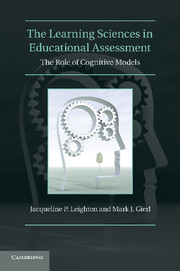Book contents
- Frontmatter
- Contents
- 1 The Learning Sciences in Educational Assessment: An Introduction
- 2 Evaluating Cognitive Models in Large-Scale Educational Assessments
- 3 Cognitive Models of Task Performance for Reading Comprehension
- 4 Cognitive Models of Task Performance for Scientific Reasoning and Discovery
- 5 Cognitive Models of Task Performance for Mathematical Reasoning
- 6 Putting It All Together: Cognitive Models to Inform the Design and Development of Large-Scale Educational Assessment
- 7 Cognitively Based Statistical Methods – Technical Illustrations
- Index
- References
7 - Cognitively Based Statistical Methods – Technical Illustrations
Published online by Cambridge University Press: 05 June 2012
- Frontmatter
- Contents
- 1 The Learning Sciences in Educational Assessment: An Introduction
- 2 Evaluating Cognitive Models in Large-Scale Educational Assessments
- 3 Cognitive Models of Task Performance for Reading Comprehension
- 4 Cognitive Models of Task Performance for Scientific Reasoning and Discovery
- 5 Cognitive Models of Task Performance for Mathematical Reasoning
- 6 Putting It All Together: Cognitive Models to Inform the Design and Development of Large-Scale Educational Assessment
- 7 Cognitively Based Statistical Methods – Technical Illustrations
- Index
- References
Summary
Research focused on the application of cognitive principles to assessment practices is thriving in educational measurement, particularly in the area of cognitively based statistical methods. Since the publication of key articles, chapters, and books two decades ago (e.g. Frederiksen, Glaser, Lesgold, & Shafto, 1990; Nichols, 1994; Nichols, Chipman, & Brennan, 1995; Ronning, Glover, Conoley, & Witt, 1990; Snow & Lohman, 1989), there has been clear recognition that inferences about examinees' knowledge and skills require detailed information on the organization, representation, and production of attributes from a cognitive model. The form that these models may take, their learning scientific foundations, and their applicability to the design and development of large-scale educational assessment are topics in this book. The desire to integrate cognition with assessment has also spawned a range of ambitious research activities designed to identify and evaluate examinees' knowledge and skills using new statistical methods. Many recent examples can be cited to document these focused research efforts. For example, an American Educational Research Association (AERA) special interest group, Cognition and Assessment, was formed in 2007 to provide a platform for scholars presenting cutting-edge research that combines the fields of cognitive psychology, cognitive science, educational psychology, educational assessment, and statistics to solve complex assessment problems using a multi-disciplinary approach. A special issue of the Journal of Educational Measurement was published in 2007 devoted to cognitively based statistical methods.
Information
- Type
- Chapter
- Information
- The Learning Sciences in Educational AssessmentThe Role of Cognitive Models, pp. 234 - 264Publisher: Cambridge University PressPrint publication year: 2011
